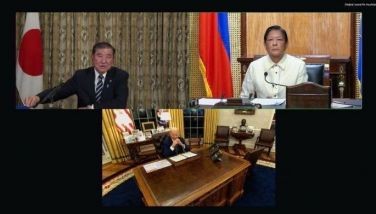Angara: GMA planning midnight deals
November 17, 2003 | 12:00am
Sen. Edgardo Angara accused President Arroyo yesterday of cooking up "midnight deals," including the sale of government properties in Japan, to raise funds for her election campaign.
"The sale of four properties in Tokyo and Kobe is part of a string of bargain deals that the Arroyo administration has worked out to advance her personal agenda. We will question these transactions as we consider them irregular and anomalous. These are midnight deals," Angara said.
He said the rush to engage in these transactions "is motivated by the desire to raise a huge fund to influence the results of the 2004 presidential elections."
By selling the Tokyo assets, Mrs. Arroyo is in effect selling the nation’s patrimony, the opposition senator stressed.
Among the properties to be privatized and demolished – two in Tokyo and two in Kobe – is the historic Fujimi-Kudan building in Tokyo. Built in 1934, it serves as the ambassador’s official residence.
Former ambassadors Ramon Farolan and Alfonso Yuchengco, and Francis Laurel, head of the Japan-Philippine Friendship Society, have opposed the sale of the Tokyo and Kobe assets.
Farolan said destroying the ambassador’s residence "would significantly diminish the prestige of future ambassadors to Japan, who might then be relegated to living quarters and surroundings less illustrious than those of other Asean envoys."
Angara said the contracts for the properties are set to be awarded on Dec. 7.
"The timing itself raises a lot of questions. The Arroyo administration is undertaking the privatization of the Japan properties only three days before the enforcement of the six-month ban on government contracts. This is very disadvantageous to the country’s interests and the Filipino people," he said.
The opposition leader is questioning two other deals that the administration has cooked up – the extension of the light rail transit system to Marilao, Bulacan, and the supply of liquor and luxury items to Duty Free Philippines that was given to Colombo Management Hong Kong, Limited (CMHL).
He said under the LRT deal, Universal LRT Corp. Limited would be paid a capacity fee over a 25-year period and the government would provide a performance undertaking.
"Both are tantamount to providing government subsidy and guarantee and these are prohibited under the Build, Operate and Transfer Law," he said.
As for the CMHL deal, he said the supplier would pay the government only 18 percent of gross sales as against the standard 40 percent to 45 percent state share for such contracts.
He added that former President Joseph Estrada ignored the CMHL deal because it was disadvantageous to the government.
He wondered who is taking the difference between 18 percent and 40 to 45 percent.
"The sale of four properties in Tokyo and Kobe is part of a string of bargain deals that the Arroyo administration has worked out to advance her personal agenda. We will question these transactions as we consider them irregular and anomalous. These are midnight deals," Angara said.
He said the rush to engage in these transactions "is motivated by the desire to raise a huge fund to influence the results of the 2004 presidential elections."
By selling the Tokyo assets, Mrs. Arroyo is in effect selling the nation’s patrimony, the opposition senator stressed.
Among the properties to be privatized and demolished – two in Tokyo and two in Kobe – is the historic Fujimi-Kudan building in Tokyo. Built in 1934, it serves as the ambassador’s official residence.
Former ambassadors Ramon Farolan and Alfonso Yuchengco, and Francis Laurel, head of the Japan-Philippine Friendship Society, have opposed the sale of the Tokyo and Kobe assets.
Farolan said destroying the ambassador’s residence "would significantly diminish the prestige of future ambassadors to Japan, who might then be relegated to living quarters and surroundings less illustrious than those of other Asean envoys."
Angara said the contracts for the properties are set to be awarded on Dec. 7.
"The timing itself raises a lot of questions. The Arroyo administration is undertaking the privatization of the Japan properties only three days before the enforcement of the six-month ban on government contracts. This is very disadvantageous to the country’s interests and the Filipino people," he said.
The opposition leader is questioning two other deals that the administration has cooked up – the extension of the light rail transit system to Marilao, Bulacan, and the supply of liquor and luxury items to Duty Free Philippines that was given to Colombo Management Hong Kong, Limited (CMHL).
He said under the LRT deal, Universal LRT Corp. Limited would be paid a capacity fee over a 25-year period and the government would provide a performance undertaking.
"Both are tantamount to providing government subsidy and guarantee and these are prohibited under the Build, Operate and Transfer Law," he said.
As for the CMHL deal, he said the supplier would pay the government only 18 percent of gross sales as against the standard 40 percent to 45 percent state share for such contracts.
He added that former President Joseph Estrada ignored the CMHL deal because it was disadvantageous to the government.
He wondered who is taking the difference between 18 percent and 40 to 45 percent.
BrandSpace Articles
<
>
- Latest
- Trending
Trending
Latest
Trending
Latest
Recommended

































